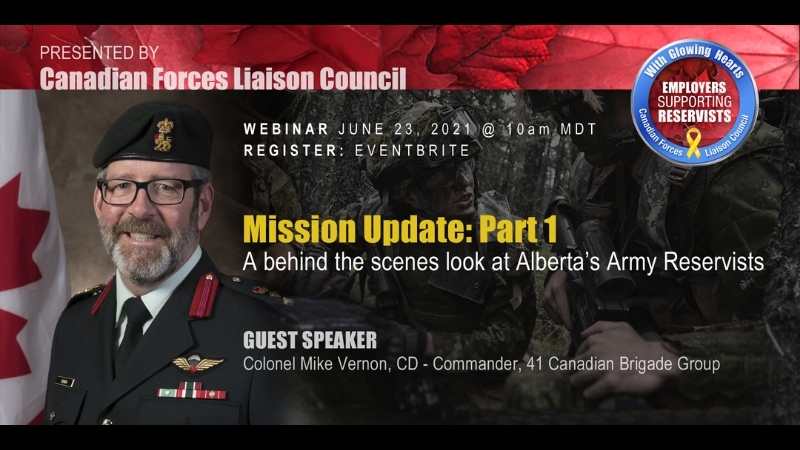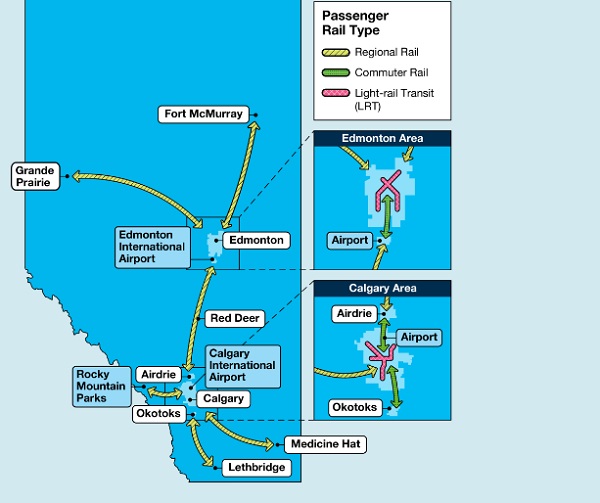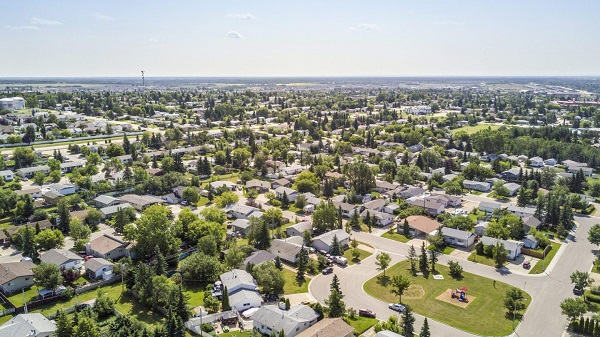Alberta
Mission Update: A behind the scenes look at Alberta’s Army Reservists

Submitted by: Canadian Forces Liaison Council
Join us for an informative webinar on June 23rd with guest speaker Colonel Mike Vernon, CD/Commander of 41 Canadian Brigade Group.
A behind the scenes look at who reservists are, what they do, and how the Alberta Reserve is preparing and training to support our communities and country when we need them most.
Numerous Alberta businesses employ individuals who are members of the Reserve Force. When Alberta faces a disaster – the Covid-19 Pandemic, fires, floods – reservists are asked to respond to the call and assist in the survival and support of our communities. Responding to these calls often pulls reservists away from their regular employment.
Reservists are skilled and talented people who are part-time “citizen soldiers”, sailors and airmen/airwomen. In addition to their military responsibilities, they also work full time in the civilian workforce. They enhance corporate culture, small and large businesses, with the experience they have attained in the military. As a candidate for a position they have a well-earned skill set that goes above and beyond another candidate for the same role. If you already employ a Reservist, you know the benefits they bring to the workplace with both hard and soft skills.
The Canadian Armed Forces provide Reservists with world class training to develop key skills which form not only the foundations of an valuable Reservist but also a highly qualified employee. Employers benefit from their core skills and abilities such as leadership, teamwork, discipline, initiative, determination, problem solving, and the ability to work under pressure.
When you employ a Reservist, they bring their learnings from the military to your organization. In turn, they also contribute their workplace expertise when serving in the military. It’s a win-win for both the organization and the Canadian Armed Forces. Reservists who serve help to provide a safe environment for businesses to thrive and is one of the very reasons many people are proud of our serving members.
The Basics
Reservists are members of the Canadian Armed Forces (CAF) who train and serve with the CAF on a part-time basis. They typically serve on weekday evenings and weekends. From time to time Reservists attend military courses and training that lasts one or two weeks and occasionally longer durations. Reservists have the opportunity to volunteer to serve on domestic and international operations on a full-time basis augmenting the regular component of the CAF. Through floods, fires or ice storms, Reservists are there to help and to keep communities and businesses operating. Their training provides both domestic response and international support – when you employ a Reservist, you in turn, are serving your country.
What is the With Glowing Hearts Initiative?
The With Glowing Hearts – Reservist Support Initiative is an HR program to attract and retain talented employees. The Canadian Armed Forces has trained over 25,000 Reservists who bring exceptional qualifications to an organization or business. Consider the Reserves as a talent pool to source potential employees to support company goals and initiatives. The initiative provides guidance and tools to support both Employers and Reservists and the good work they do together. Employing a Reservist is good for business and it makes your work, and workplace, better – With Glowing Hearts, we stand together supporting our community and country.
How does the program work?
It’s simple – like any other HR initiative, the program becomes an offering to attract employees. For example, a company may already have a maternity leave policy in place, growth programs for leadership, or even policies for internships. The With Glowing Hearts – Reservist Support Initiative creates a “reserve-friendly” culture for an organization to attract, and keep, experienced and valued employees. The turnkey program assets can be used to create awareness through communication channels of choice.
What does the program include?
The program consists of the following elements:
- Reservists 101: What Reservists offer Employers
- “With Glowing Hearts” Reservist support customized certificate for Employers
- “With Glowing Hearts” Employer/Reservist Recognition stickers
- “With Glowing Hearts” Customized employer support icon (online use)
- HR & FAQS: Q&A for employing Reservists
- Military Leave Policy (MLP): Examples of MLP for small and large businesses
What’s next?
- Register for the program or for more information: cflcwithglowinghearts.ca
How can I find out more information for my business?
Employers Supporting Reservists – Canadian Forces Liaison Council
Visit the website: https://www.canada.ca/en/department-national-defence/services/benefits-military/supporting-reservists-employers.html
Alberta
Passenger rail experts from across the world to inform Alberta’s Passenger Rail Master Plan

Alberta’s future runs on rails
Alberta’s government is bringing together passenger rail experts from across the world to share best practices and inform the province’s Passenger Rail Master Plan.
As Alberta experiences record growth and evolving transportation needs, passenger rail infrastructure and services will be vital for enhancing accessibility and connecting communities. To support this, Alberta’s government is developing a Passenger Rail Master Plan to build the optimal passenger rail system for the province.
As part of the development of the plan, Alberta’s government is hosting a one-day forum to provide an opportunity for Alberta communities, industry and experts to collaborate and share information on passenger rail opportunities and challenges. The forum includes experts from Ontario, Quebec, California, Italy, Spain and Japan who are involved in passenger rail procurement, governance and operations. The sessions will allow for the sharing of best practices and lessons learned on passenger rail planning and development.
“Alberta was built by innovators and visionaries who saw potential in our province and its people. They believed that if you could dream it, you could achieve it. We believe there is opportunity and demand for passenger rail services in Alberta. Today’s forum marks an important step forward in the development of our Passenger Rail Master Plan and in achieving our vision for passenger rail.”
In line with the province’s commitment to engaging Albertans throughout the development of the Passenger Rail Master Plan, a survey has been launched to seek public input on passenger rail. Albertans are invited to complete the online survey by Dec. 20 to help shape the future of passenger rail in Alberta. There will be additional opportunities for Albertans to have their say on passenger rail in the future, including regional open houses which will be held in early 2025.
“Feedback from Albertans, Alberta municipalities, Indigenous communities and industry will be critically important to developing passenger rail services in Alberta. I encourage all Albertans to complete the online survey to help inform a shared vision for passenger rail to enhance accessibility, efficiency, and connectivity across the province.”
In April 2024, Alberta’s government shared its vision for passenger rail and announced the development of the Passenger Rail Master Plan for Alberta. The province’s vision is for an Alberta passenger rail system that includes public, private or hybrid passenger rail, including:
- a commuter rail system for the Calgary area that connects surrounding communities and the Calgary International Airport to downtown
- a commuter rail system for the Edmonton area that connects surrounding communities and the Edmonton International Airport to downtown
- passenger rail that runs between Calgary and Edmonton and the Rocky Mountain parks
- a regional rail line between Calgary and Edmonton, with a local transit hub in Red Deer
- municipal-led LRT systems in Calgary and Edmonton that integrate with the provincial passenger rail system
- rail hubs serving the major cities that would provide linkages between a commuter rail system, regional rail routes and municipal-led mass transit systems
The vision includes a province-led “Metrolinx-like” Crown corporation with a mandate to develop the infrastructure and oversee daily operations, fare collection/booking systems, system maintenance, and planning for future system expansion.
Quick facts
- The Passenger Rail Survey will be open until Dec. 20.
- Alberta’s Passenger Rail Master Plan is expected to be completed by summer 2025 and will include:
- a comprehensive feasibility assessment
- financial and delivery model options
- governance and operations recommendations
- a 15-year delivery plan
- public engagement
Related information
Alberta
REPORT: Alberta municipalities hit with $37 million carbon tax tab in 2023

Grande Prairie. Getty Images photo
From the Canadian Energy Centre
Federal cash grab driving costs for local governments, driving up property taxes
New data shows the painful economic impact of the federal carbon tax on municipalities.
Municipalities in Alberta paid out more than $37 million in federal carbon taxes in 2023, based on a recent survey commissioned by Alberta Municipal Affairs, with data provided to the Canadian Energy Centre.
About $760,000 of that came from the City of Grande Prairie. In a statement, Mayor Jackie Clayton said “if the carbon tax were removed, City property taxes could be reduced by 0.6 per cent, providing direct financial relief to residents and businesses in Grande Prairie.”
Conducted in October, the survey asked municipal districts, towns and cities in Alberta to disclose the amount of carbon tax paid out for the heating and electrifying of municipal assets and fuel for fleet vehicles.
With these funds, Alberta municipalities could have hired 7,789 high school students at $15 per hour last year with the amount paid to Ottawa.
The cost on municipalities includes:
Lloydminster: $422,248
Calgary: $1,230,300 (estimate)
Medicine Hat: $876,237
Lethbridge: $1,398,000 (estimate)
Grande Prairie: $757,562
Crowsnest Pass: $71,100
Red Deer: $1,495,945
Bonnyville: $19,484
Hinton: $66,829
Several municipalities also noted substantial indirect costs from the carbon tax, including higher rates from vendors that serve the municipality – like gravel truck drivers and road repair providers – passing increased fuel prices onto local governments.
The rising price for materials and goods like traffic lights, steel, lumber and cement, due to higher transportation costs are also hitting the bottom line for local governments.
The City of Grande Prairie paid out $89 million in goods and services in 2023, and the indirect costs of the carbon tax “have had an inflationary impact on those expenses” in addition to the direct costs of the tax.
In her press conference announcing Alberta’s challenge to the federal carbon tax on Oct. 29, 2024, Premier Danielle Smith addressed the pressures the carbon tax places on municipal bottom lines.
“In 2023 alone, the City of Calgary could have hired an additional 112 police officers or firefighters for the amount they sent to Ottawa for the carbon tax,” she said.
In a statement issued on Oct. 7, 2024, Ontario Conservative MP Ryan Williams, shadow minister for international trade, said this issue is nationwide.
“In Belleville, Ontario, the impact of the carbon tax is particularly notable. The city faces an extra $410,000 annually in costs – a burden that directly translates to an increase of 0.37 per cent on residents’ property tax bills.”
There is no rebate yet provided on retail carbon pricing for towns, cities and counties.
In October, the council in Belleville passed a motion asking the federal government to return in full all carbon taxes paid by municipalities in Canada.
The unaltered reproduction of this content is free of charge with attribution to the Canadian Energy Centre.
-

 Brownstone Institute22 hours ago
Brownstone Institute22 hours agoThe Most Devastating Report So Far
-

 Economy1 day ago
Economy1 day agoCOP 29 leaders demand over a $1 trillion a year in climate reparations from ‘wealthy’ nations. They don’t deserve a nickel.
-

 Censorship Industrial Complex1 day ago
Censorship Industrial Complex1 day agoAnother Mass Grave?
-

 ESG9 hours ago
ESG9 hours agoCan’t afford Rent? Groceries for your kids? Trudeau says suck it up and pay the tax!
-

 Alberta1 day ago
Alberta1 day agoMAiD In Alberta: Province surveying Albertans about assisted suicide policies
-

 Energy1 day ago
Energy1 day agoOttawa’s proposed emission cap lacks any solid scientific or economic rationale
-

 Alberta1 day ago
Alberta1 day agoOn gender, Alberta is following the science
-

 International10 hours ago
International10 hours agoElon Musk praises families on X: ‘We should teach fear of childlessness,’ not pregnancy


